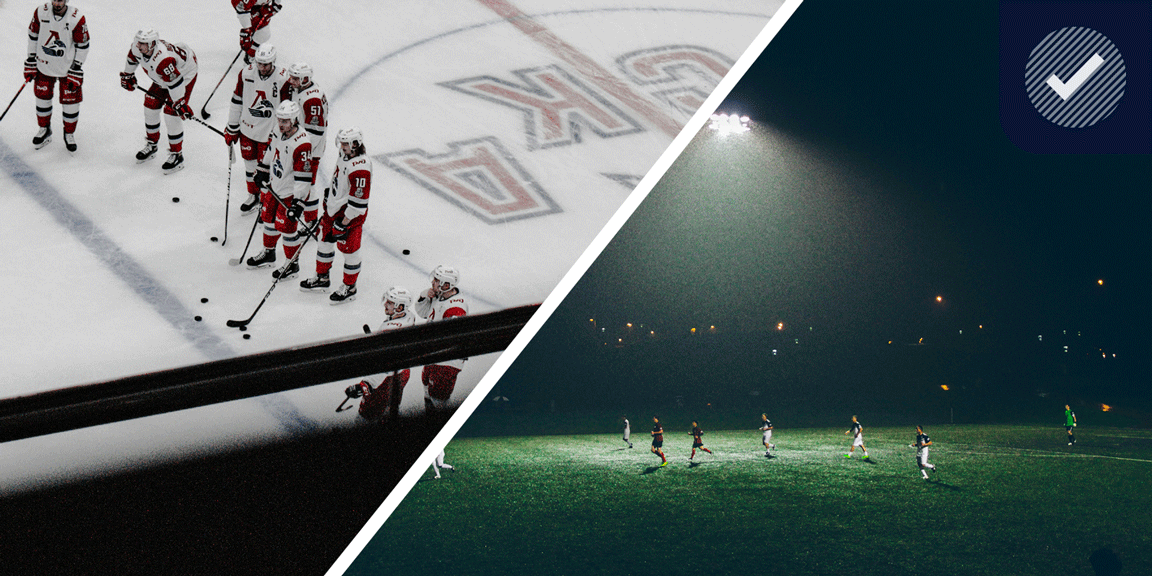Why Snus are so popular among athletes and in which sports they are most frequently consumed, you can find out in the following article. You can also read how smoking in particular has negative effects on fitness, while various studies show a measurable increase in athletic performance with smokeless oral nicotine products.
What are the benefits of Snus in sports?
Snus is probably so popular with athletes, and especially professional athletes, because the Snus effect can lead to a temporary increase in psychomotor performance without this being penalized by doping controls. Many users report effects such as a boost in endurance and an increase in concentration and alertness - which, depending on the sporting discipline, can certainly provide certain competitive advantages.
In addition, nicotine, the substance in Snus, which leads to the desired effects, can have a relaxing effect, especially in higher doses. Many professional athletes appreciate this and claim that it helps them to "relieve stress" after intensive training or competition sessions.
As soon as there is talk of possible competitive advantages, the question arises as to whether nicotine and therefore snus consumption should be classed as doping.
Is nicotine on the doping list?
The Prohibited List published by the World Anti-Doping Agency (WADA) is regarded as the international standard for the fight against doping and substance abuse in the sporting environment. It is updated at least once a year with the involvement of the entire anti-doping community.
To date - including the requirement in force since 1 January 2024 - nicotine is not listed as a "prohibited substance", but has been included in the so-called "monitoring program" since 2012.*1 The aim of this monitoring program is to observe the use of substances listed in the list during competition. It also includes caffeine and bupropion, for example. The latter substance is a psychotropic drug that is frequently used in the smoking cessation.
In which sports is the Snus consumption particularly popular?
Whether in ice hockey or soccer, skiing or handball; in the USA also increasingly in baseball or American football - snus consumption is becoming more and more popular and is a noticeable trend among professional athletes. It has been known for some time that, especially in Europe, ice hockey and soccer players are increasingly turning to oral tobacco, and more recently to nicotine pouches without tobacco.
A dissertation published by the University of Bonn at the end of 2023 retrospectively investigated the prevalence of nicotine or its main metabolite cotinine in urine samples from top German athletes for the period 2016-2018. According to the results, it was possible to detect nicotine consumption in 15% of all cases.*2 Which sport leads the way here might surprise some - so they say:
"Die höchste Prävalenz im Profisport wurde im Baseball (50%) gefunden, gefolgt von Skisport (34%), Handball (26,2%) und Eishockey (24,1%). Ein signifikant höherer Nikotinkonsum wurde im Teamsport im Vergleich zum Einzelsport festgestellt. Die Prävalenz des Nikotinkonsums stieg signifikant von 13,7% im Jahr 2016 auf 20,1% im Jahr 2018, entgegen dem Trend in der Normalbevölkerung. Ebenso stieg die Anzahl der Dopingproben mit einer Konzentration =5 µg/ml Nikotin/Cotinin, insbesondere in der Sportart "Fußball"."*3
Now one could argue that with the detection of cotinine in urine samples does not differentiate between the different forms of consumption, which means that smoking could also have taken place. At this point it goes on to say:
"Angesichts der nachteiligen Auswirkungen herkömmlicher Zigaretten auf Atemwege und Ausdauer von Spitzensportler*innen kann angenommen werden, dass das nachgewiesene Nikotin/Cotinin hauptsächlich aus rauchlosem Tabak stammt.“*4
However, it is also impossible to tell whether only smokeless tobacco or also tobacco-free nicotine products were consumed. And so the figures may in any case also include the consumption of nicotine pouches. However, the actual relationship between Snus-/nicotine pouch consumption and other smokeless forms of nicotine consumption remains an open question.
An increase especially in Snus-/nicotine pouch products in professional soccer was recently confirmed by a study conducted by the Professional Footballers' Association (PFA). According to the study, one in five professional players specifically use these smoke-free products and two out of five players said they had tried them at least once.*5
>> Here you can find out more about whether Snus are legal in the stadium at all
Is Snus bad for your condition?
Numerous articles can be found on the Internet on the subject of "nicotine and its effects on fitness", some of which argue for a considerable deterioration in fitness or athletic performance. However, most of them focus on smoking tobacco cigarettes and do not differentiate enough between the smoke-free oral consumption of nicotine, as is the case with Snus. And what may well apply to smoking does not necessarily apply to another form of consumption. This seems important because for a comparison of Snus-consumption and smoking, the following will apply to any possible impairment of fitness caused by nicotine:
- If tobacco smoke damages the lungs, thereby limiting their functioning, but this contributes significantly to fitness, smoking will inevitably have negative effects on fitness. In addition, tobacco smoke contains numerous toxic substances that only enter the body through the combustion process and could lead to impaired performance.*6
- If carbon monoxide (CO) in particular is absorbed into the body when tobacco smoke is inhaled, binds to haemoglobin and thus reduces the ability to absorb oxygen, there will be an immediate drop in performance during sport if the oxygen supply is essential for performance.*7
- Smokeless oral use at least eliminates those factors that damage the lungs and the absorption of CO via tobacco smoke. All the negative effects on fitness that this has are therefore eliminated if, instead of smoking, Snus are used.
A conclusion from the effects of smoking to the effects of Snus on fitness will therefore not be meaningful for this reason alone.
Fitness vs. athletic performance
Colloquially, fitness and athletic performance are often used synonymously, but fitness is commonly understood to be just one factor of this performance. It would therefore be better to ask what effects Snus and more precisely its active ingredient nicotine does have on athletic performance. There are also studies that seek precicely to clarify this.
Studies on possible performance enhancement through nicotine
A study from 2022 (published in the "International Journal of Environmental Research and Public Health") investigated "The effect of a high nicotine dose on maximal anaerobic performance and perceived pain in healthy non-smoking athletes". The results of this cross-sectional study are rather sobering and prima facie seem to contradict the psychomotor performance enhancement mentioned at the beginning - but suggest that a reduced perception of pain intensity could indeed have a performance-enhancing effect. This is what the summary says:
"Results: The results revealed that oral administration of an 8 mg nicotine dose does not significantly improve any of the physical performance parameters monitored. We only reported the statistically significant positive effect in RPE (p = 0.03). Conclusion: Lower perception of pain intensity that we reported after nicotine application might be an important factor that affects performance. However, we did not report any improvement in physical performance parameters."*8
As this is just one study result, which is linked to its reference system with all its framework conditions, it is interesting to compare several studies. A scientific study by the University of Vienna from 2019 looked at this using a systematic review - and the results are certainly more positive:
"Results: The diversity of the study design makes interpretation of the results a difficult undertaking. Nevertheless, tables have been created to help in presenting the results. The results show that nicotine can have a positive effect on various parameters of athletic performance, although a clear and global statement does not seem possible at this moment."*9
In particular, three studies included in the comparison indicate an increase in performance through Snus according to the paper:
"Positive Auswirkungen konnten von Mündel et al. (2017), Johnston et al. (2018) und Zandonai et al. (2018) festgestellt werden in Bezug auf das Drehmoment des Beinstreckers bzw. der anaeroben Spitzen- und Durchschnittsleistung bzw. der Zeit zur Erschöpfung."*10
Taking a closer look at the systematic review, it is noticeable that these studies are consistent in that the subjects were administered smoke-free oral nicotine products. In one case in particular Snus with 8 mg nicotine were used. As the paper also states with regard to another study from 2016, it was possible to measure a higher oxygen enrichment in the tissue of the muscles and the brain, although an increase in performance due to Snus was not measurable in this study.*11
Increased performance in sport through Snus
The aforementioned study results therefore suggest that Snus could have positive rather than negative effects on athletic performance. In some cases such effects were measurable with oral products, in one case specifically with Snus. However, how long-term consumption affects the fact that nicotine is addictive and, even if it can be performance-enhancing in the short/medium term, could at least be harmful to health in the long term, remains unaffected by this and should be taken into consideration.
Snus during sport vs. smoking and sport
Why athletes prefer snus consumption to smoking tobacco cigarettes should be particularly clear when the latter - as mentioned above - is not only Medium- and long-term, but even short-term negative effects on fitness and athletic performance. And if performance-enhancing factors also speak in favor of snus consumption, it should now be easier to understand why Snus (has become/) are so popular in sport.
-----------------------------------------------------------
*1 See also: https://www.wada-ama.org/en/prohibited-list
*2,3,4 https://bonndoc.ulb.uni-bonn.de/xmlui/handle/20.500.11811/11169
*5 https://www.reuters.com/sports/soccer/pfa-study-shows-one-five-players-using-nicotine-pouches-or-tobacco-products-2024-05-29/
*6,7 See also: https://www.dkfz.de/de/tabakkontrolle/download/Publikationen/FzR/FzR_Sport_und_Rauchen_ein_Widerspruch.pdf
*8 https://www.mdpi.com/1660-4601/20/2/1009
*9,10,11 https://utheses.univie.ac.at/detail/52298/




















